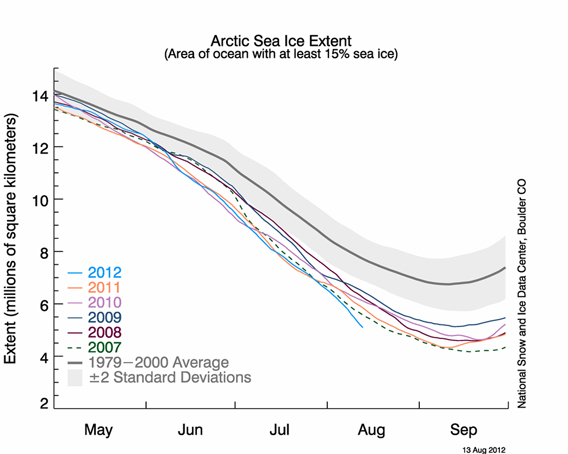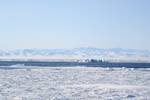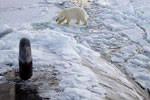
Bottom blue line represents sea ice extent as of August 13th, tracking well below the record set in 2007. Graph courtesy of U.S. National Snow and Ice Data Center. Click to enlarge.
Sea ice extent in the Arctic is very near to beating the previous record low set in 2007, according to the U.S. National Snow and Ice Data Center. Researchers told Reuters that they expect the record to be beaten by the end of month, well over a week before the melt season ends in the frozen north.
In 2007 the sea ice extent fell to a record nadir of 4.28 million square kilometers (1.66 million square miles), astonishing experts and prompting a second look on how quickly sea ice might disappear from the Arctic altogether during the summer. But researchers say sea ice extent could fall below 4 million square kilometers (1.5 million square miles) this year if current melt trends continue.
Arctic sea ice has been disappearing far faster than scientists initially predicted. Predictions once focused on sea ice disappearing for a time in the summer by 2100, then it was 2050 or 2040, and now some researchers say sea ice could disappear before the end of the decade.
“Everything about this points in the same direction: we’ve made the Earth warmer,” Ted Scambos with the National Snow and Ice Data Center told Reuters. “What you’re seeing is more open ocean than you’re seeing ice,” he said. “It just simply doesn’t look like what a polar scientist expects the arctic to look like. It’s wide open and the [ice] cap is very small. It’s a visceral thing. You look at it and that just doesn’t look like the Arctic Ocean any more.”
While climate change has warmed the Earth by 0.8 degrees Celsius (1.44 degrees Fahrenheit) since the early Twentieth Century, temperatures across the Arctic have risen at a considerably higher rate, making the region a bellwether for global climate change. Melting sea ice in the Arctic not only impacts the region’s ecosystems and wildlife, but also has an impact on global weather. While the sea ice melt heralds vast climatic changes worldwide, many Arctic governments have seen it as an opportunity to exploit the untouched fossil fuel resources of the Arctic.
Related articles
Greenland suffers record melt
(08/16/2012) Four weeks before Greenland’s melting season usually ends, it has already blown past all previous records. By August 8th, nearly a month before cooler weather usually sets in around the world’s largest island, the island toppled the past record set in 2010.
Climate change creating “novel ecosystem” in Arctic
(06/06/2012) If melting sea ice and glaciers weren’t enough, now climate change is producing what researchers call a “structurally novel ecosystem” in the northwestern Eurasian tundra. Warmer weather and precipitation changes in the region, which covers western Russia into Finland, has allowed shrubs of willow and alder to grow into sparse forests within just forty years, according to a new study in Nature Climate Change. The new ecosystem could have global implications as researchers say it is likely to worsen global warming due to a decline in the region’s albedo, i.e. the sunlight reflected back into the atmosphere due to snow cover.
Obama Administration, Shell moving ahead with Arctic oil exploitation

(04/02/2012) Last week, the U.S. Department of the Interior approved oil spill clean-up plans by Royal Dutch Shell Oil in the Beaufort Sea, paving the way for offshore oil drilling in the Arctic to begin as soon this year. The Interior’s approval was blasted by environmentalists, who contend that oil companies have no viable way of dealing with a spill in the icy, hazardous conditions of the Arctic, far from large-scale infrastructure. Shell, which has spent $4 billion to date to gain access to the Arctic, must still be granted final permits for drilling.
Arctic warms to highest level yet as researchers fear tipping points

(02/13/2012) Last year the Arctic, which is warming faster than anywhere else on Earth due to global climate change, experienced its warmest twelve months yet. According to recent data by NASA, average Arctic temperatures in 2011 were 2.28 degrees Celsius (4.1 degrees Fahrenheit) above those recorded from 1951-1980. As the Arctic warms, imperiling its biodiversity and indigenous people, researchers are increasingly concerned that the region will hit climatic tipping points that could severely impact the rest of the world. A recent commentary in Nature Climate Change highlighted a number of tipping points that keep scientists awake at night.
Opposition rising against U.S. Arctic drilling
(02/09/2012) Drilling in the Arctic waters of the U.S. may become as contested an issue as the Keystone Pipeline XL in up-coming months. Scientists, congress members, and ordinary Americans have all come out in large numbers against the Obama Administration’s leases for exploratory drilling in the Beaufort Sea and the Chuckchi Sea.
Featured video: Arctic ice melt creates mass walrus ‘haul-outs’
(10/06/2011) The disintegration of the Arctic sea ice, which hit the second lowest record this year, is forcing a number of Arctic animals to change their behavior.
Obama administration opens more of the Arctic to drilling
(10/05/2011) Nearly 500 Arctic oil and gas leases from the Bush administration have been restarted this week by the Obama administration. Known as Chukchi Lease 193, the various leases had been held up in court after environmental groups and indigenous groups challenged them, citing a significant lack of baseline information about the Chukchi Sea ecosystem. The Obama administration now says that many of the ecosystem gaps need not be filled, but Arctic indigenous and environmental groups disagree.